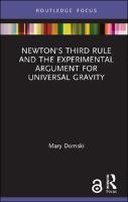Explore

Newton's Third Rule and the Experimental Argument for Universal Gravity
Mary Domski
2022
0 Ungluers have
Faved this Work
Login to Fave
This book provides a reading of Newton’s argument for universal gravity that is focused on the evidence-based, "experimental" reasoning that Newton associates with his program of experimental philosophy. It highlights the richness and complexity of the Principia and also draws important lessons about how to situate Newton in his natural philosophical context. The book has two primary objectives. First, it defends a novel interpretation of the third of Newton’s four Rules for the Study of Natural Philosophy – what the author terms the Two-Set Reading of Rule 3. Second, it argues that this novel interpretation of Rule 3 sheds additional light on the differences between Newton’s experimental philosophy and Descartes’s "hypothetical philosophy," and that it also illuminates how the practice of experimental philosophy allowed Newton to make a universal force of gravity the centerpiece of his explanation of the system of the world. Newton’s Third Rule and the Experimental Argument for Universal Gravity will be of interest to researchers and advanced students working on Newton’s natural philosophy, early modern philosophy, and the history of science.
This book is included in DOAB.
Why read this book? Have your say.
You must be logged in to comment.
Rights Information
Are you the author or publisher of this work? If so, you can claim it as yours by registering as an Unglue.it rights holder.Downloads
This work has been downloaded 76 times via unglue.it ebook links.
- 76 - pdf (CC BY-NC-ND) at OAPEN Library.
Keywords
- Descartes
- early modern experimental philosophy
- history of science
- History of Western philosophy
- Humanities
- hypothetical philosophy
- Isaac Newton
- Mary Domski
- Mathematics & science
- one-set reading
- Philosophy
- Principia
- Science: general issues
- thema EDItEUR::P Mathematics and Science::PD Science: general issues::PDX History of science
- thema EDItEUR::Q Philosophy and Religion::QD Philosophy::QDH Philosophical traditions and schools of thought::QDHR Western philosophy from c 1800
- third rule
- two-set reading
- universal gravity
- universal qualities
- Western philosophy, from c 1900 -
Links
DOI: 10.4324/9781003184256Editions

